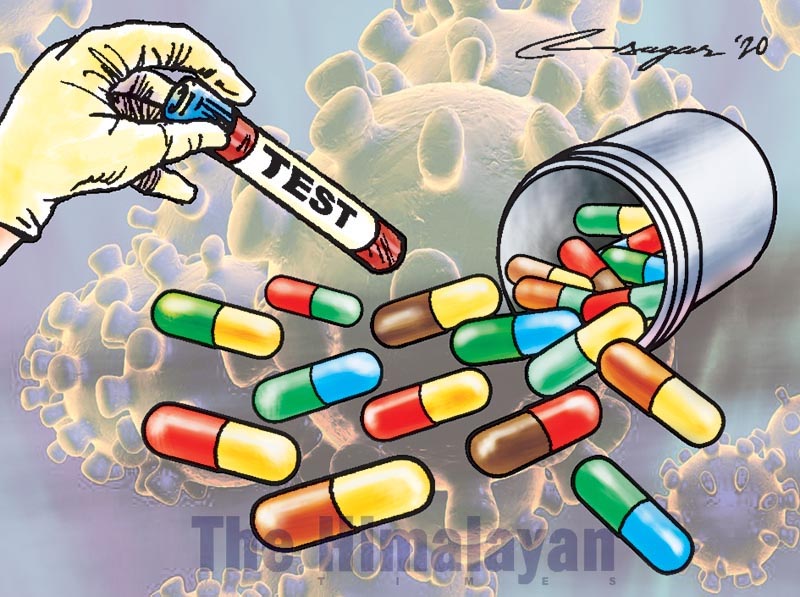Patent war amidst global pandemic: Public health must prevail
While a patent in itself is an important factor in pharmaceutical research, it cannot be more important than the health of a patient. The reason for inventing medicines is to cure people, not to create a profit-generating industry
The coronavirus has been making headlines every day. With every passing day, we see a rapid growth in the number of people and areas affected by the coronavirus. The number of people affected is nearing 200,000 in 164 countries as of this moment, and the numbers are increasing every minute.
Coronavirus disease 2019 (COVID 19), now declared a global pandemic by the World Health Organisation, has been creating panic in the world. Countries have been declaring a travel ban, and toilet paper and sanitisers are out of stock. Even in Nepal, we’re hearing news about people being arrested for black marketing of masks. Lack of verified facts and floating rumours are to be blamed for this panic. With every new disease comes a new cure, new medications, and along with them new patents. At present, there is no confirmed vaccine and treatment available even though different countries and private pharmaceutical companies have been investing a lot in research and development to formulate a medication for this pandemic. All these companies are likely to seek patents for their proposed cure.
On February 24, WHO declared that a drug, Remdesivir, had a good chance of showing efficacy against the coronavirus. Remdesivir was created by a U.S. company, Gilead, together with the U.S. government in an effort to cure the Ebola virus, but the drug was not successful. Another drug, Choloroquine, has been identified as a potential treatment for COVID-19. Choloroquine being used to treat malaria is now in the public domain, and therefore cannot be patented again. However, it is not the same for Remdesivir.
The Cell Research paper stated that Remdesivir was identified as a potential cure for the coronavirus, but it also stated that the cure was discovered, not by Gilead but by seven scientists from Wuhan Institute of Virology. Wuhan Institute has also showed its intent to patent this drug. This is where things get tricky. Gilead had granted a COVID-19 infected patient the use of the drug under the Gilead Compassionate Programme, and as previously mentioned in one research paper, the patient had recovered soon. Even though there is no absolute proof that it was the drug that cured him, Gilead is now offering easy access to the drug to more patients in the US, Europe and Japan under the Expanded Access Programme. The Expanded Access Programme allows access to drugs that have not received marketing approval in case of emergency situations. This is why the news that the Chinese institute was applying for the patent of this drug caused a ruckus. China has been trying to claim a patent on a drug that was invented by Gilead, a US-based company, on the grounds of second medical use. If the patent is granted, it could erode the already weak incentives for pharmaceutical companies to invest in drugs to combat this disease and other diseases that may arise in the future.
The question that needs to be looked at right now is not who should get the patent, China or the US, but why there is a need for a patent at this time of a global crisis. With the devastating effect of the virus not only in one country but world-wide, it is not yet clear why a patent is necessary. The controversy surrounding patenting of pharmaceuticals dates back to 1990, when most countries did not allow such patenting. There has always been constant conflict between the developed countries and developing countries with respect to patenting drugs. This is evident from the contradictory views of our two neighbours, India and China.
The Chinese National Intellectual Property Administration at a press conference stated that “drug research and development is expensive, time-consuming and risky and, therefore, requires strong intellectual property protection”. Whereas India, a developing country often in the midst of many instances of patent disputes, has been giving priority to public health against private pharmaceutical profit. In most cases, the developed countries and their pharma industry often abuse the patent system in order to profit from the sale of drugs. The pricing system is mostly unconscionable and affects the poorer countries that cannot afford the drug.
While a patent in itself is an important factor in pharmaceutical research, it cannot be more important than the life or health of an actual patient. We must not forget that the real reason for inventing medicines is to cure people and not to create a profit-generating industry. If a cure is found, the main concern should be to cure the people and help the most affected regions.
In the case of developing and under-developed countries, if any developed country patents the drug, it will be very difficult for many families to sustain the costs that come along with it. Most people are not even aware about the cause and symptoms of the virus, let alone the after-effects of patent exclusivity on any drug. This might result in a crisis similar to the one caused by the unaffordable medications during the AIDS outbreak in Africa.
In light of the severe health risks posed by the coronavirus, it might not be the best time to patent any drug right away. Now is not the time to fight over patents. It is that time when the health of the public needs to be given priority over the ability of the drug makers to make a profit.
Bhattarai works in the intellectual property law team of Pioneer Law Associates






